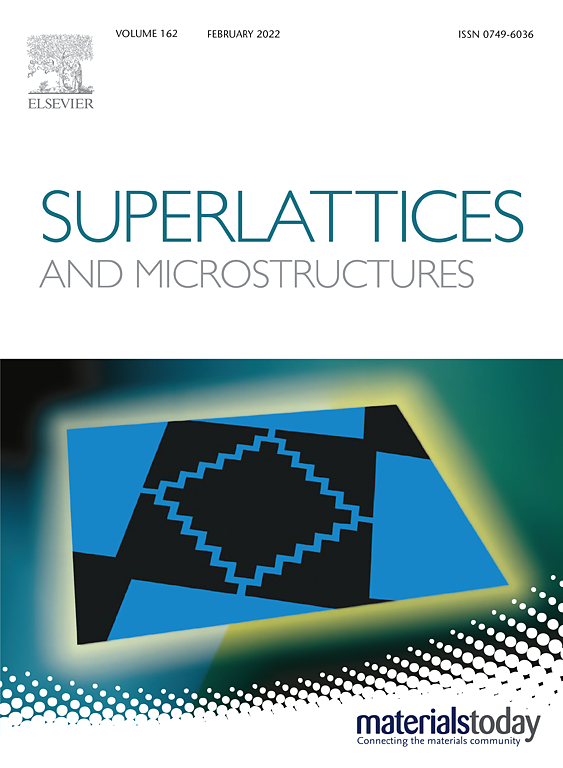含非化学计量铋BiFeO3-BaTiO3无铅压电陶瓷的研究
IF 3.3
3区 物理与天体物理
Q2 PHYSICS, CONDENSED MATTER
引用次数: 0
摘要
BiFeO3-BaTiO3 (BF-BT)基无铅陶瓷具有较高的居里温度和优异的电化学性能,是一种很有前途的压电材料。本研究成功制备了0.70Bi1+x FeO3-0.30BaTiO3 (B1+x F-BT, x = -0.01, 0.00, 0.01, 0.02, 0.03, 0.04)无铅压电陶瓷。全面研究了不同成分的晶体结构、微观结构、介电、阻抗、铁电和压电性能。x射线衍射分析证实,所有成分均表现出典型的钙钛矿结构,具有立方-菱形相混合物。随着Bi2O3含量的增加,陶瓷的晶粒尺寸有增大的趋势。特别是,后向散射电子图像和能量色散分析揭示了颗粒内明显的核壳微结构。其中,含有1%过量铋的BF-BT陶瓷的最大d值为33 ~217 pC/N,最大d值为~243 pm/V,居里温度高达515℃。研究结果表明BF-BT陶瓷在无铅压电陶瓷领域具有潜在的可行性。本文章由计算机程序翻译,如有差异,请以英文原文为准。
Investigation of BiFeO3-BaTiO3 lead-free piezoelectric ceramics with nonstoichiometric bismuth
BiFeO3-BaTiO3 (BF-BT)-based lead-free ceramics are promising piezoelectric materials exhibiting high Curie temperatures and excellent electrochemical properties. In this study, 0.70Bi1+x FeO3-0.30BaTiO3 (B1+x F-BT, x = -0.01, 0.00, 0.01, 0.02, 0.03, 0.04) lead-free piezoelectric ceramics were successfully fabricated via the conventional solid-phase reaction process. Crystallographic structure, microstructure, dielectric, impedance, ferroelectric, and piezoelectric properties among different compositions were comprehensively investigated. The X-ray diffraction analysis confirmed that all compositions exhibited a typical perovskite structure with a cubic-rhombohedral phase mixture. The grain size of ceramics tends to increase as the Bi2O3 content rises. In particular, the backscattered electron images and energy dispersive analysis revealed prominent core-shell microstructure within grains. Notably, the BF-BT ceramic containing 1% excess Bi displayed the maximum d 33 ~217 pC/N and ~243 pm/V accompanied by a high Curie temperature of 515 °C. The findings demonstrate the potential feasibility of BF-BT ceramics in the field of lead-free piezoelectric ceramics.
求助全文
通过发布文献求助,成功后即可免费获取论文全文。
去求助
来源期刊

Superlattices and Microstructures
物理-物理:凝聚态物理
CiteScore
6.10
自引率
3.20%
发文量
35
审稿时长
2.8 months
期刊介绍:
Superlattices and Microstructures has continued as Micro and Nanostructures. Micro and Nanostructures is a journal disseminating the science and technology of micro-structures and nano-structures in materials and their devices, including individual and collective use of semiconductors, metals and insulators for the exploitation of their unique properties. The journal hosts papers dealing with fundamental and applied experimental research as well as theoretical studies. Fields of interest, including emerging ones, cover:
• Novel micro and nanostructures
• Nanomaterials (nanowires, nanodots, 2D materials ) and devices
• Synthetic heterostructures
• Plasmonics
• Micro and nano-defects in materials (semiconductor, metal and insulators)
• Surfaces and interfaces of thin films
In addition to Research Papers, the journal aims at publishing Topical Reviews providing insights into rapidly evolving or more mature fields. Written by leading researchers in their respective fields, those articles are commissioned by the Editorial Board.
Formerly known as Superlattices and Microstructures, with a 2021 IF of 3.22 and 2021 CiteScore of 5.4
 求助内容:
求助内容: 应助结果提醒方式:
应助结果提醒方式:


